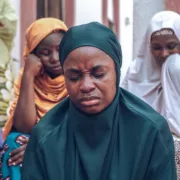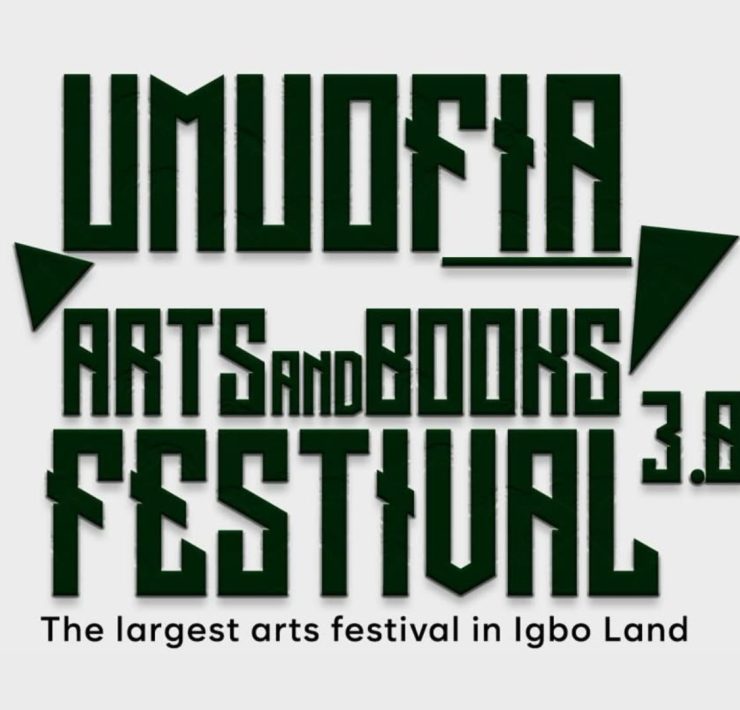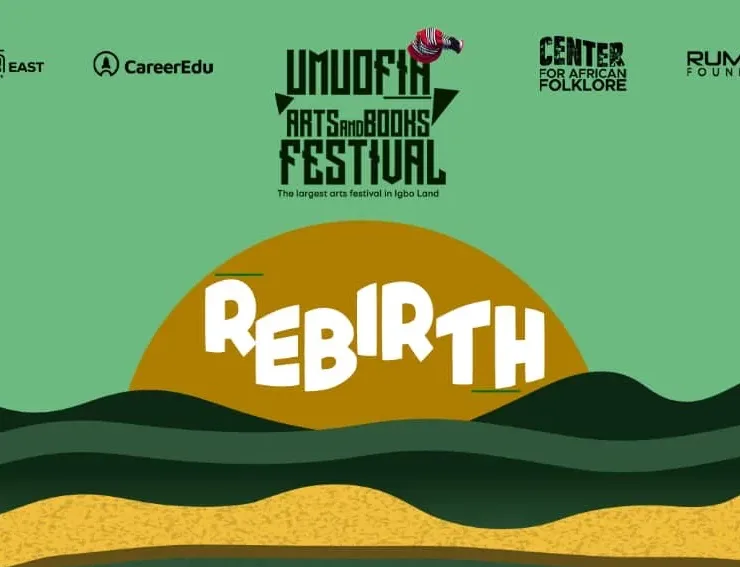There are moments that could never be captured completely in words. The second edition of the Umuofia Arts and Books Festival is what you would call an epiphanic experience.
By Chidera Chinedu
There are moments that could never be captured completely in words. The second edition of the Umuofia Arts and Books Festival is what you would call an epiphanic experience.
Held in the beautiful city of Enugu, which smelled of sapid hope and was bursting with youthful energy, the festival doors were opened on the first day of August. The Center for Memories welcomed us with open arms. Guests walked through the long hall, admiring the art and the stories told in moulded statues, dusty Biafran uniforms, and memories captured with frames and camera lenses. As an Igbo girl, the stories rang a bell in my head which reminded me of who I was and that I wasn’t walking alone.
The festival started off with an opening session of poetry from the beautiful Idorenyin and the compelling voice of Ada Ide. Right after that came a panel session on the romanticisation of tragedy, moderated by Ugochukwu Anadi. The topic of tragedy was broken into parts by the Eaglenest team members.
Unknown to most of us, discussions regarding tragedy as the most appealing genre in literature would linger throughout the rest of the festival. The iconic Chuma Nwokolo would mention it in his panel session, imploring writers to instill a bit of humour into their works, regardless of how dark their stories might be, as the world is in need of a little humour.
A discussion on the future of Nigerian literature was held by the writers: Carl Terver, founder and editor-in-chief of Afapinen magazine; prolific essayist, Chimezie Chika; and the author of the recently published Loss is an Aftertaste of Memories, Michael Chiedoziem Chukwudera. The discussion ended on an optimistic note, with writers in the audience nodding and snapping their fingers at the gems of wisdom imparted by these wordsmiths.

Right after that, there was a book chat between Harachi Nnamchi and the co-editor of Akowdee Magazine, Prince Ihè, about her recently published book titled Kachifo Nu. Harachi spoke at length about the plight and ridiculous expectations of the average Nigerian woman. Her next panel discussion, “Writing Women: The Female Perspective That Must Be Heard”, which took place on the second day of the festival, conveyed her impassioned opinions on matters regarding feminism.
The next panel session centred on building sustainable community and development initiatives in the South-East. Community builders like the graceful Ada Onwudiwe and Iheanyi Igboko spoke at length about the importance of community building and its economic and social benefits. Day one was wrapped up with the premiere of Olisa Eloka’s short film, Loose Canons.
The movie captured the strong emotions surrounding the aftermath of loss from the massacre of the Biafran War. With barely any words from the main character, Ijezie, no one could deny the cathartic feeling that passed through the audience as the film came to an end. The end of day one provided the assurance we needed for greater expectations.

Day two strolled in like a familiar masquerade, heavy and present. People took pictures on the red carpet excitedly, exchanging witty banter about the individuals they were looking forward to seeing. Chiagoziem Orji and Igbobinna Eze, art doyens in their own right, opened the event with face and hand paintings for everyone.
Later on, they both spoke during the panel discussion on Ulyrism, Indigenous art, and the Portrayal of the Otherworldly, which was moderated by Chimezie Chika. Those who were novices to the thought processes behind the creation of timeless art were given a glimpse into the minds of these artists and what inspired their works.
Agoziem, the popular Uli artist, spoke highly of the Igbo language and how much it influenced her art. Igbobinna—her fellow Uli artist who is becoming renowned for his depiction on the intersection of the world of the living and spirits—spoke at length about how music could be seen in his paintings. His philosophical bearings portrayed him as not just a man of mere talent, but also of depth.
The next panel session delved into poetry and featured poetry maestros like Amu Nnadi, whom I am amused to refer to as “The Serenader”, and Chinualumogu Ezenwa-Ohaeto, a decorated poet, essayist, and prose writer. This session was moderated by the festival organiser Chukwudera, who posed very thought-provoking questions.
Their thoughts on poetry provided fresh perspectives. “A poet’s intoxications are his own”, were the words of Nnadi when he explained that it is not an obligation to restrict oneself to the stifling rules of poetry. Although this opinion might have been up for debate in some circles, one could not deny that, truly, a part of the beauty of poetry lies in self-expression.
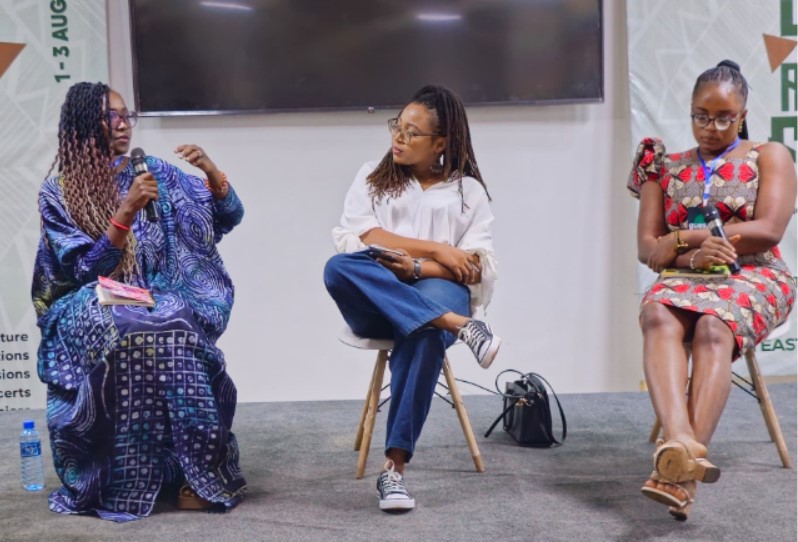
A panel session on intersectionality in contemporary Nigerian art took place with Igbobinna Eze, Abike Osoba, and Prince Ihè. Ada Onwudiwe, Frances Ogamba, and Harachi Nnamchi spoke about the female perspective. Questions from the audience that could spark controversy were directed at the panel speakers, and every response was given with grace.
Adachukwu Onwudiwe moderated a panel on the Nigerian novel across philosophy and politics with the renowned writer, poet, and lawyer, Chuma Nwokolo. Before the session kicked off, he held the audience’s attention in the palm of his hand with a refrain from the poem he recited to everyone.
As though we had all rehearsed the refrain a day before, we all knew when to respond, “ha na-enwe obodo enwe”, right when it was time. If the poem was only an appetizer, then the main discussion was a mouth-watering feast for intellectuals. The second day of the festival came to a close with a drama performance from the Ijele Theatre.
In our little circles, while we trudged down the hilly paths of Enugu in the dark, we chatted excitedly about the panel discussions we had loved, the quotes that struck a chord in our minds, and the personas we wanted so badly to emulate, because in that time and space, everyone seemed to be the best version of themselves.
Day three could not have arrived any sooner. It felt like an impatient visitor that had been waiting at the door for a while. Everyone showed up in dazzling traditional attire and million-dollar smiles. The expectations in our cups surely overflowed.
After a quick session of interviews and quirky photographs, the director of the Umuofia festival, Michael Chiedoziem Chukwudera, gave a speech on Chinua Achebe and the legacy he had left behind. This ushered in the panel discussion on the 60th anniversary of Achebe’s Arrow of God (Heinemann 1964), which was led by Ikhide Ikheloa and Chuma Nwokolo. Right after that was the book chat on Umar Abubakar Sidi’s The Incredible Dreams of Garba Darkaskus with Chiedoziem Chukwudera.
Umar Abubakar Sidi introduced many of us to the concept of Sufism, which he infused into his work. Another book chat followed, featuring the poised Rosemary Okafor and popular book influencer Ezioma Kalu. They spoke at length about her book, Akwaugo, and cheesy romantic fictional works in general. You could see some members of the audience trying to hide their grins while others attempted to quell the blush rising beneath their cheeks.
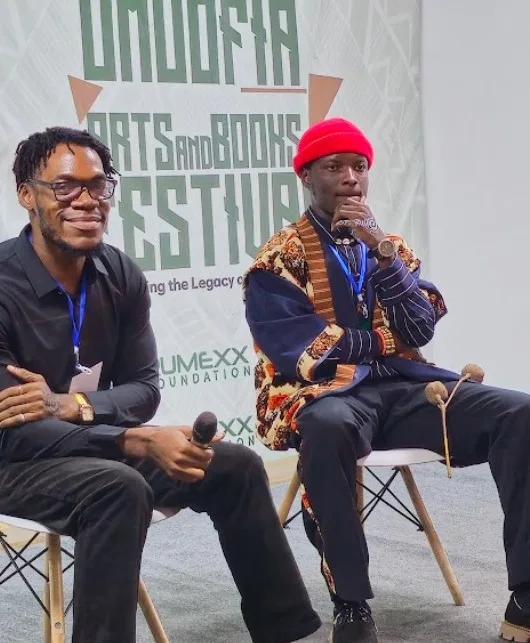
At the close of the discussion, she shared her success story, and there is little surprise if she barely realised how many young hearts she encouraged in that fleeting moment. Something about the atmosphere made one feel unstoppable; something about it made hope feel like a living thing.
Then came the final panel session, which questioned the impact of culture on music. The session was moderated by writer and music journalist, Emmanuel Esomnofu, and the speakers included the talented “Jukwese” crooner, Somtopapi, and the man who brought stories to life with his Oja, Gerald Eze. They kick-started the concert that would follow.
There were performances from the sonorous Pamela Scott, DDK, and the Afro Horns Academy, as well as Rabbai, the Hip-Hop star Ganiru, Somtopapi, the sound maestro known as Jvbal, and our resident serenader Amu Nnadi. To say that a great time was had would do zero justice to the experience that was our focus for three days.
When it had all ended and we had come down from our highs, there was still the tingling feeling of being unstoppable. It felt as though we had just been given permission to dream again. It might have been the hills, the blue skies, or the room filled with million-dollar smiles that we walked into every morning for the past three days.
But there was one thing we knew for certain: we would hold on to that feeling until the next edition of the Umuofia Arts and Books Festival strolled by. It was probably already waiting at the bus stop with its bags, promising another utopia better than the one we had just witnessed.
Faithful Chidera Chinedu is an Igbo creative from Anambra state, Nigeria. She loves to write fiction and creative nonfiction that reflects her identity. Her works have been published in the Kalahari review and elsewhere.
Sign Up to Our Newsletter
Get notified about exclusive offers every week!



